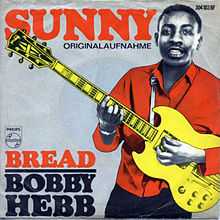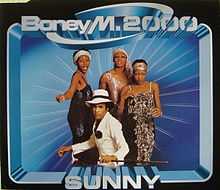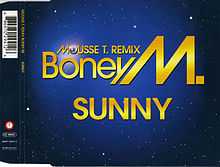"Sunny" is a song written by Bobby Hebb. It is one of the most covered popular songs, with hundreds of versions released. BMI rates "Sunny" number 25 in its "Top 100 songs of the century."[1]
Background and writing
Hebb's parents, William and Ovalla Hebb, were both blind musicians. Hebb and his older brother Harold performed as a song-and-dance duo in Nashville, beginning when Bobby was three and Harold was nine. Hebb performed on a TV show hosted by country music record producer Owen Bradley.
Hebb wrote the song in the 48 hours following a double tragedy on November 22, 1963, the day U.S. President John F. Kennedy was assassinated and Hebb's older brother Harold was stabbed to death outside a Nashville nightclub. Hebb was devastated by both events and many critics say that those events & critically the loss of his older brother inspired the lyrics & tune. According to Hebb, he merely wrote the song as an expression of a preference for a "sunny" disposition over a "lousy" disposition following the murder of his brother.[2]
Events influenced Hebb's songwriting, but his melody, crossing over into R&B (#3 on U.S. R&B chart) and Pop (#2 on U.S. Pop chart), together with the optimistic lyrics, came from the artist's desire to express that one should always "look at the bright side"; a direct quote from the author. Hebb has said about "Sunny": "All my intentions were to think of happier times & pay tribute to my brother – basically looking for a brighter day – because times were at a low. After I wrote it, I thought 'Sunny' just might be a different approach to what Johnny Bragg was talking about in 'Just Walkin' in the Rain.'"
Recording
The personnel on the original recording included Joe Shepley, Burt Collins on trumpet, Micky Gravine on trombone, Artie Kaplan and Joe Grimaldi on sax, Artie Butler on piano, Joe Renzetti and Al Gorgoni on guitar, Joe Macho on bass, Al Rogers on drums and George Devens on percussion. the song was originally recorded while the session was in overtime, so many of the studio musicians booked for that date had to leave early for other recording sessions they were booked for.
"Sunny" was originally part of an 18-song demo recorded by producer Jerry Ross, also famous for Spanky and Our Gang, Keith's "98.6" and Jay and the Techniques (Hebb was the first artist to cover "Apples, Peaches, Pumpkin Pie", but didn't want to be considered a novelty act and let the song go to Jay Proctor). "Sunny" was first recorded in Japan by Mieko "Miko" Hirota – the "Connie Francis of Japan", where it was said to have done well on the charts.
In America it was released by marimbaphonist Dave Pike on Atlantic Records in 1966 on the Jazz for the Jet Set album, well before Philips released Hebb's 45 version produced by Ross and arranged by Joe Renzetti. This information was made public – as well as sounds from the first two versions of "Sunny" – on the BBC's Songlines program in early 2006.
"Sunny" was recorded at Bell Sound Studios in New York City and released as a single in 1966. It met an immediate success, which resulted in Hebb touring in 1966 with The Beatles.
Sunny '76
"Sunny '76" is a disco version of Bobby Hebb's song. Like the original 1966 version, it features Hebb. However, the song was updated with a disco beat so that the music would be played in disco rooms around the world.
The 7" single was released in late 1975 (although it's entitled '76). The b-side featured another Hebb's song called "Proud Soul Heritage".
Boney M. version
It was recorded by German euro disco group Boney M., produced by Frank Farian and arranged by Stefan Klinkhammer in a euro disco arrangement. It was taken from their 1976 debut album Take the Heat off Me, following their breakthrough single "Daddy Cool" and was another major hit single that topped the German charts. It has been remixed in 1988 and 1999 (it was a minor hit single early 2000) and was sampled by Boogie Pimps for their 2004 version. While Liz Mitchell sang the original lead vocals on Boney M.'s version, original member Maizie Williams recorded a solo version in 2006.
Boney M's version has become the most popular and entered the TOP 10 in many countries,[3] incl. UK,[4] France [5] and others.
The song is featured in the films Repentance (1987) and "Boogie Nights" (1997).
The single was backed by a non-album track "New York City," a reworked version of Farian artist Gilla's 1976 hit single "Tu es!" / "Why Don't You Do It" with an intro borrowed from the album track "Help Help," issued only in some territories instead of "Baby Do You Wanna Bump."
In 2011, the Korean movie "Sunny" became a box office hit in South Korea. The song of the same name performed by Boney M. was used in the final scene. The song went to number one in the national single chart of South Korea.
2000 remix
The final single from Boney M.'s remix album 20th Century Hits which peaked at #80 in the Swiss charts. The CD single was released with 8 mixes. A "London Mix" was released on the promotional double-12" single.
Mousse T. remix
A download-only single from the group's 2006 compilation The Magic of Boney M.
- "Sunny" (Mousse T. Radio Mix) - 3:21
- "Sunny" (Mousse T. Sexy Disco Radio Mix) - 3:27
- "Sunny" (Mousse T. Extended Radio Mix) - 4:17
- "Sunny" (Mousse T. Sexy Disco Club Mix) - 5:48
Other cover versions
- Many other artists have recorded versions of the song. Georgie Fame's and Cher's issues both charted in the UK Top 75 in 1966. Other covering artists include Andy Williams, Shirley Bassey, Public Enemies, Richard Anthony, James Brown and Marva Whitney, Wes Montgomery, Robert Mitchum, the Classics IV, the Electric Flag, Jose Feliciano, Stevie Wonder, Ella Fitzgerald, The Four Seasons, The Four Tops, Marvin Gaye, Earl Grant, Mary Wells, Paul Carrack, David Clayton-Thomas, Jamiroquai, Stanley Jordan, Marion Rung, Mina, Jimmy Smith, Johnny Mathis, Les McCann, Chris Montez, The Head Shop, Leonard Nimoy, Wilson Pickett, Los york's, Del Shannon, Nick Cave, Oscar Peterson with Joe Pass and Ray Brown, Dusty Springfield, Helge Schneider, War, Ajico, Gary Lewis and the Playboys, Twinset featuring Barnaby Weir, The Electric Flag, Terrorgruppe and The Walker Brothers.
- Chilean singer Buddy Richard recorded the song in Spanish in 1964 with the title "Cielo" (meaning "darling" or "honey").
- Serbian-Yugoslavian singer Bisera Veletanlić recorded a version in Serbo-Croatian in 1967.[6]
- Luis Miguel recorded the song in Spanish for his 1987 album Soy Como Quiero Ser.
- Frank Sinatra covered "Sunny" with Duke Ellington on their collaborative album, Francis A. & Edward K..
- Herb Alpert & the Tijuana Brass made an instrumental version of "Sunny" on the LP album "The Brass Are Comin'" launched in 1969 (A & M SP 4228).
- Cy Coleman's jazz instrumental version appeared on the Record World "Non-Rock Top 40" in 1970.
- Yambu recorded a 12" inch extended play disco version of "Sunny" released in 1975. That version of the song is used in the Stephen Chow movie, CJ7.
- Cris Barber recorded a version of the song on her 2008 album This Moment to Be Free.
- Christophe Willem covered the song in 2006 (#3 in France, #9 in Belgium (Wallonia), #17 in Switzerland).[7]
- Mark Ronson did a live cover with Candie Payne at the Electric Proms
- Saxophonist Stanley Turrentine also covered the song on his album "The Spoiler."
- Guitarist Pat Martino covered the song in 1972 on his first live album.
- Arranger Pino Presti covered the song in 1976 on his album 1st Round (Atlantic Records T50274)
- Mexican rock group Los Yaki covered this song and renamed it "Sonia"; it was later performed by the ska band Panteon Rococo.
- Brazilian musician Léo Jaime made a Portuguese-language translation/adaptation of the song, entitled "Sônia". It is present in his debut 1984 album Phodas "C".
- Japanese guitarists Issei Noro of Casiopea, Masahiro Andoh of T-Square and Hirokuni Korekata of KORENOS, covered this song with their supergroup, Ottottrio, on their 1998 album Triptych.
- Bill Cosby covered this song on his 1968 album Bill Cosby Sings Hooray for the Salvation Army Band!
- Ronnie Dove covered the song in 1970 on the independent Wrayco Records. However, it did not chart.
- Justin Guarini performed this song in the Top 8 round of American Idol Season 1.
- Italian singer Scanna performed this song on the Montefiori Cocktail's album Raccolta N. 2.
- Andreas Weise performed this song on his first audition of Swedish Idol Season 7.
- Popular Japanese band Ulfuls performed a Japanese cover, titled "Yonin".
- Duo Diva Fever performed the song during the seventh season of The X Factor.
- The song was also covered by Sunny, a Korean singer from the popular girl group Girls' Generation, during their first Asia Tour.
- The Chopsticks (a Hong Kong female duo, made up of Sandra Lang (Chinese: 仙杜拉) and Amina (Chinese: 亞美娜)), covered this as a medley song with "Chain Of Fools", "Gimme Little Sign", "Uptight (Everything's Alright)" on their 1971 LP All Of A Sudden.
- An instrumental version of the song has been recorded by Booker T. and the M.G.'s and another by Manfred Mann on their 1966 EP Instrumental Assassination.
- A previously unreleased version by the 1970s British vocal group Design was included on their 2012 CD One Sunny Day: Singles and Rarities 1968-1978.
- Bryan Adams covered the song for his 2014 album Tracks of My Years.
- A cover of the song was featured in season 2 episode 8 of the Showtime series Ray Donovan, also titled "Sunny". The cover was performed by Kerris Dorsey and Octavius Johnson.[8]
In Pop Culture
In 1996, World Wrestling Entertainment (WWE) have used this song as a video montage for former manager Tammy Lynn Sytch, who was then known as Sunny.
Charts
- Cher version
| Chart (1966) |
Peak
position |
| Norwegian Singles Chart[9] |
2 |
| Dutch Singles Chart |
2 |
| Swedish Singles Chart |
4 |
| UK Singles Chart[10] |
32 |
| Japanese Singles Chart |
86 |
Year-end charts
| Chart (1966) |
Position |
| Dutch Singles Chart[11] |
32 |
|
- 1976 Boney M. version
| Chart |
Peak
position |
| Germany Singles Chart |
1 |
| UK Singles Chart |
3 |
| Austria Singles Chart |
1 |
| Norway Singles Chart |
4 |
| Switzerland Singles Chart |
2 |
| Netherlands Singles Chart |
1 |
| Belgium Singles Chart |
1 |
| Sweden Singles Chart |
11 |
| New Zealand Singles Chart |
17 |
| South Korea Singles Chart |
1 |
| Japan Singles Chart |
41 |
| Ireland Singles Chart |
4 |
| France Singles Chart |
1 |
References
External links
|
|---|
| | | Studio albums and
main compilations
(1976–1985) | |
|---|
| Main compilations
and remix albums
(1986–present) | |
|---|
| Main single
discography | |
|---|
|  Book Book |
|
|
|---|
| | | | Studio albums | |
|---|
| | Compilations | |
|---|
| | Soundtracks | |
|---|
| | Music video releases | |
|---|
| | Live releases | |
|---|
| | Other video releases | |
|---|
| | Concert tours | |
|---|
| | Residency shows | |
|---|
| | Motion pictures | |
|---|
| | Documentaries | |
|---|
| | Television | |
|---|
| | Theatrical plays | |
|---|
| | Books | |
|---|
| | Related music | |
|---|
| | Related tours | |
|---|
| | Related soundtracks | |
|---|
| | Record companies | |
|---|
| | Related articles | |
|---|
| |
|
|
|---|
| | 1960s | |
|---|
| | 1970s | |
|---|
| | 1980s | |
|---|
| | 1990s | |
|---|
| | 2000s | |
|---|
| | 2010s | |
|---|
| | Guest singles | |
|---|
| |
|
|
|---|
| | Albums | |
|---|
| | Singles | |
|---|
| | Associated articles | |
|---|
|






